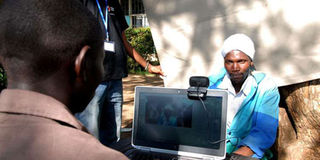Let’s use E-voting in the 2017 General Election

A voter has his picture taken during the Biometric Voter Registration exercise at St. Teresa's Girls Secondary School, Nairobi, on November 20, 2012. PHOTO | SALATON NJAU | NATION MEDIA GROUP
What you need to know:
- IEBC has not shown the necessary competence to carry out elections transparently, fairly and freely.
- How we register as voters, and how we vote next year is as important as how the IEBC is constituted, its competence and impartiality.
- The country that uses iTax, e-Citizen, M-Pesa, and Huduma Centres with ease, can be the first to make this transition.
As the debate rages on about the fate of the Independent Electoral and Boundaries Commission (IEBC), and ways of resolving this impasse, public attention has focused on three areas.
First, a sense among many players, not all, that IEBC, as it is currently constituted, cannot be a fair referee. Second, that IEBC has not shown the necessary competence to carry out elections transparently, fairly and freely. And third, therefore the current IEBC has to leave. The country seems seized of these concerns.
For now, all these are matters of conjecture, political persuasion, and even political negotiation, best left to the wide spectrum of interested parties to sort out in good time, and in the constitutionally mandated mechanisms in the coming weeks and months.
We haven’t looked at the fourth element, which is how voters will be registered, and how will they vote, because at the end of the day, that’s what really matters.
In my humble opinion, how we register as voters, and how we vote next year is as important as how the IEBC is constituted, its competence and impartiality.
As one considers the massive budgets proposed by the secretariat in preparation for 2017 General Election, and how technology seemed to fail last time, one has to wonder whether or not there are alternatives to spending billions on equipment that cannot last from one election to another.
Is there really no easier, more affordable, and most efficient way to register voters, and to enable them vote in a way that ensures their vote counts? The growing ease of using e-Citizen persuades me that there is a possibility of another cost-effective way.
We are already using e-Citizen for application and renewal of identity cards, passports, and driving licences, showing it has the capabilities of identifying and confirming who we really are, and after doing so, providing us with legal documents.
Surely, what can be more legal proof of photo identity than the identity card (ID), passport or driving licence?
As a society, we have also become adept at using technology for paying and filing taxes through iTax, and the use of mobile money platforms such as M-Pesa.
Moreover, more than 50 per cent of Kenyans have smartphones and, if we combine this with a general literacy rate of 85 per cent, and mobile savvy population of 80 per cent of people aged over 18, then we are possibly socially and technologically ready for digital voting.
VOTER REGISTRATION
So, while e-voting probably does not exist anywhere else in the world, it would seem Kenya would be a good place to start. The proposal being made here is for the country to consider developing a system to register voters online, provide them with verifiable voter registration, create an online voter register, and enable online voting and vote tallying on election day.
Such a system would achieve three things. First of all, every voter would be verified against the national identification register. Second, each voter would have a unique barcode voter registration. Third, the country would have a single verifiable voters register that is essentially unalterable, creating the necessary trust in the voter registration process.
It would also be a relatively cheap process with most voters registering online from their PCs, tablets or phones, and Huduma Centres. Possibly, 80 per cent or more of the potential voters could easily register through this system, and the rest could then be assisted at more traditional polling centres.
The use of Unstructured Supplementary Service Data (USSD) systems to register and verify at least three-quarters of the potential voters would represent an enormous technological advance and save money.
The same USSD system can then be developed to create e-ballots, which would be constituency and ward specific, allowing the Kenyan e-voter to vote from their PC, tablet or phone, for those able to do so, and the traditional paper ballot for the few that are technologically challenged.
It may also allow duly registered diaspora voters to vote from wherever they are. The e-voting would also mean that votes can be counted in real time, and tallying would be virtually tamper proof.
One may wonder whether what I am proposing is viable and possible. I am convinced the country that uses iTax, e-Citizen, M-Pesa, and Huduma Centres with ease, can be the first to make this transition.
So let’s unleash our national capacity to build the world’s first e-voting system, so that when the political debate on IEBC is concluded, we have the most transparent, cost-effective, free and fair voting system in place for the 2017.
The writer comments on social and public policy issues




